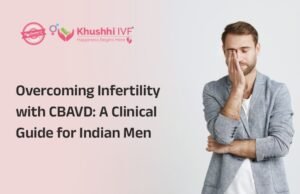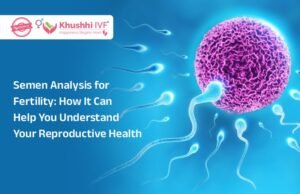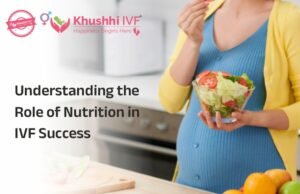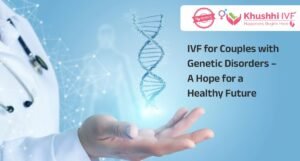If you are searching for answers to what is IVF treatment for pregnancy and who should go for it, then you have landed at the right place. There may be lots of questions, doubts and anxiety about the whole treatment, so let us help you out with genuine answers. Couples facing any signs of infertility can choose an IVF treatment procedure to get healthy babies. Read on to find all the details about IVF treatment.
What is IVF?
In Vitro Fertilization is an assisted reproductive technology (ART) that helps couples facing any form of infertility issue get pregnant through a step-by-step medical procedure. The literal meaning of the term ‘In Vitro’ means ‘In glass’ in Latin, so the exact meaning is that when a woman’s egg is fertilized with sperm in a petri dish in a laboratory, it is termed as IVF. Basically, the fertilization of eggs is made to happen outside the human body under a controlled and monitored environment in a lab.
The fertilized egg is then inserted into the uterus of the woman, where it gets attached to the inner lining of the uterus (endometrium) and eventually develops into a baby.
Why might I need IVF?
If you are a couple facing any form of untreatable infertility issues due to any of the following reasons, then IVF is recommended for you. The most common reasons for choosing IVF are:
- Women with blocked or damaged Fallopian tubes will face the issue of infertility. As the sperm and fertilized egg travel through the fallopian tube, their journey is not complete, leading to infertility.
- When the endometrium tissue is found outside the uterus as opposed to the normal position within the uterus.
- Poor health and low sperm count in males
- Women face Primary Ovarian Insufficiency (POI), in which ovaries stop releasing the eggs or stop working at all before the age of 40.
- If ovaries have been removed due to any reason
- Poor egg quality in women or low number of eggs produced is called Diminished Ovarian Reserve (DOR)
- Unexplained infertility due to unknown reasons
Who may be referred for IVF?
If you know what is IVF treatment for pregnancy then you must also know who can benefit from it. Apart from the above-mentioned reasons, there are some exceptional cases where the IVF treatment procedure proves to be a boon to getting healthy babies. I listed them as follows:
- Same-sex couples who cannot get pregnant naturally
- People who may opt for surrogacy for any reasons
- People with any normal or genetic disorder that makes them unfit for pregnancy
- Women facing recurrent pregnancy loss
- Women who have had their uterus removed for any reason
- Individuals with genetic disorders choose IVF to prevent the genetic issue from transferring to their progeny. In this case, the embryo is tested before being transferred into the uterus.
- Women facing postmenopausal time
- When women must choose donor eggs to get pregnant. This could be due to POI or any other unavoidable reason.
The Process of IVF
IVF is a stepwise procedure that may take 2 to 4 weeks to execute. A bundle of all these steps is called an IVF cycle. Following are the steps in an IVF cycle:
Step 1: Ovarian Stimulation
In this step, a woman is INJECTED with drugs to develop more eggs during one cycle. Primarily, only one egg is formed every month in a woman’s body, but IVF treatment uses medications or fertility drugs to stimulate the ovaries to produce more than one egg. The reason is that they collect more eggs and fertilize them so that they can transfer only those embryos that have the best chances of pregnancy.
An exception to unstimulated IVF is when healthcare experts choose not to stimulate the ovaries for excess egg production. In this case, the single egg is collected from the woman’s body, fertilized in the lab, and then transferred to the uterus. However, the success ratio of this kind of natural cycle IVF is quite low compared to the IVF treatment performed with ovary stimulation.
Step 2: Egg retrieval
This step is performed after 36 hours of OF TRIGGER INJECTION ONCE FOLLICES ARE READY AFTER INJECTIONS and involves retrieving the eggs from the ovarian follicles by passing a needle through the vagina into the ovaries. It takes around 15 to 20 minutes and is done with general anaesthesia or local sedation to avoid any discomfort.
Step 3: Egg fertilization
Once the eggs are removed, they are mixed with sperm from a partner or donor and placed in a petri dish. When the sperm penetrates the egg, it is called a fertilized egg. Statistically, 65% to 80% of the eggs get fertilized in this step. If the partner suffers from male factor infertility or poor-quality sperm, which results in the death of sperm before penetrating the egg, then the medical expert injects the sperm directly into the egg. The process of injecting the sperm is called intracytoplasmic sperm injection (ICSI). THIS IS ONE OF THE ADVANCED METHOD IN IVF PROCESS
Step 4: Embryo Culture
Fertilized eggs divide and become embryos within 2 to 5 days. They are placed under close observation in the lab.
Step 5: Embryo transfer
There are two kinds of processes for embryo transfer – fresh embryo transfer and frozen embryo transfer
1. Fresh embryo transfer: It means one or more embryos are taken from the same cycle as egg retrieval and inserted into the uterus through a catheter, just five days after egg fertilization. This may be supplemented with progesterone hormone, which helps to thicken the wall of the uterus so that the embryo can attach to it easily.
2. Frozen embryo transfer: In this method, medical experts freeze the embryos so that they can use them for future IVF cycles, in case the first cycle does not result in pregnancy. It also saves the woman from going through the steps from ovarian stimulation to egg fertilization in the next IVF cycle. Again, it saves the money spent on these steps. Storing frozen embryos for future use is termed cryopreservation.
In this case, the frozen embryo is first thawed and then inserted into the uterus.
EMBRYOS ARE FROZEN WHEN FOR OTHER PURPOSES LIKE IF THE PATIENT OPT FOR ANY ADVANCE TECHNOLOGY LIKE PGT-A OR PGT-M
Confirmation of Pregnancy after IVF
Medical experts take blood tests 12 TO 14 days after embryo transfer to check the hCG, the hormone formed during pregnancy, in the blood. The presence of this hormone in the blood confirms pregnancy.
Following this, the birth of a healthy baby completes the treatment.
Who do I talk to about getting treatment?
If you are a sexually active couple with no signs of pregnancy even after 1-2 years of unprotected sex, then you might be facing infertility issues. Consult a medical expert who can confirm infertility and may recommend you to an IVF clinic. You can consult the IVF experts to understand the whole process and prepare yourself if needed.
You are in safe hands after connecting with healthcare professionals offering IVF treatment procedures.
Potential risks associated with IVF:
As the entire process is not natural, there are chances of certain risks, which may or may not occur depending on individual health. Some of the risks are:
- Ovarian hyperstimulation syndrome (OHSS) – Due to medications, the ovaries may get more stimulated, swell and leak fluid in other organs like the abdominal cavity and chest. BUT DUE TO THE AVAILABILITY OF NEWER MEDICATION AND FREEZING, NOW ALL CLINICS HAVE A 0 % OHSS RISK
- Ovaries and fallopian tubes may get twisted in some cases, resulting in interruptions in the blood flow
- Allergies of any kind due to fertility and IVF-assisting medicines
- Complications due to anaesthesia
- Infection, in some cases
- Multiple pregnancy requires implanting more than one embryo.
- Ectopic pregnancy is the case when the embryo gets attached to any place away from the lining of the uterus. 2% of women going through IVF face this problem.
- Heterotopic pregnancy is the case when one embryo attaches to the lining of the uterus and another to any place outside the uterus. 1 in 100 to 1 in 1000 women face this.
Duration of IVF
One IVF cycle can take anywhere from 2 to 6 weeks between ovary stimulation, pregnancy detection and follow-up observations. However, it may take around 2-4 months, including the first consultation, preconception steps, fertility testing, and more processes performed as per the individual case. In some cases, before the ovary stimulation step, healthcare experts may also take a ‘pre’ step, which involves giving birth control pills to the woman planning for IVF. This step is taken to prevent the formation of ovary cysts and regulate the menstrual cycle.
Chances of having a baby with IVF
The success of IVF and the chances of having a healthy baby depend on many factors, like the age of the woman, the sperm count, egg quality, lifestyle, and other health factors. However, we can list the chances of having a baby with IVF according to the age of the woman. This data is gathered for women using their eggs and not donor eggs in IVF. As per the data from the Society for Assisted Reproductive Technology (SART), the chances of live births through IVF are as follows:
- Women under the age of 35 have a 41% chance of having a healthy baby after first embryo transfer. With a second embryo transfer, the chances increase to 47%.
- Women between the ages of 35 & 37 have shown 31.6% success
- Women between the ages of 38 and 40 have shown 26.8% success ratio
- Between age 40 & 42 have 7% to 10% chances
- And then, the higher the age, the slimmer the chances. Ladies above 42 show only 3% success in IVF treatment procedures.
The Success Rate of IVF
When everything goes well, the success ratio of the IVF treatment procedure is 40%. Having said that, IVF is still the most common Assisted Reproductive Treatment for couples facing fertility problems. It has resulted in 8 million babies since its first trial in 1978.
Conclusion
IVF is recommended for couples facing any kind of infertility issues. Even if you are 25 years of age, you may need to consult an IVF treatment provider. The younger you are, the better the results will be.
Khushhi IVF is a highly rated IVF treatment center in Ahmedabad with a highly successful track record. We make sure that the would-be-mother is safe while bringing her dream of a healthy baby to reality. Feel free to connect with us for a consultation to discuss IVF possibilities and check whether it is a good option for you or not. Just reach out to our team, and we will be happy to help you!!





